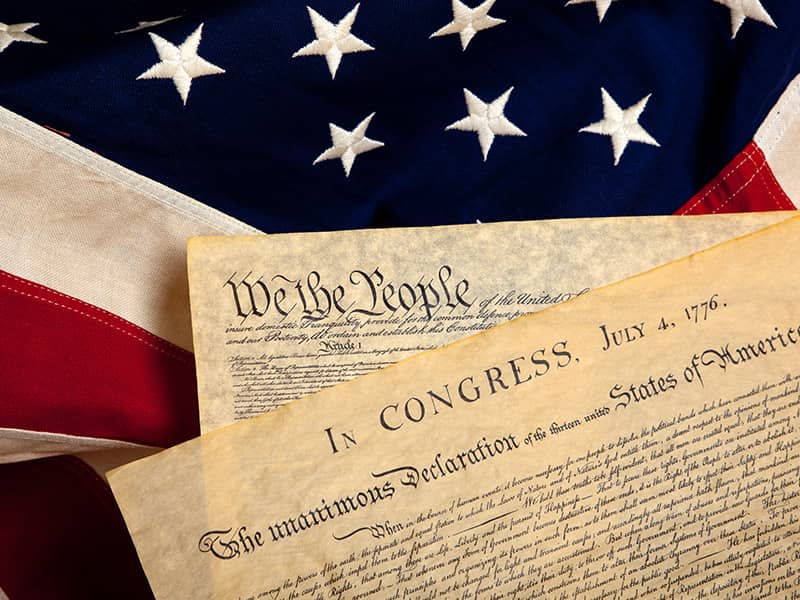"[Americans] must seek Divine guidance in the policies of their government and the promulgation of their laws." --Ronald Reagan
For Reagan, spiritual faith was not something to hang in the closet upon taking political office. As governor he had often relied on prayer for guidance, and after entering the White House he felt he needed prayer as much as ever. And politics, he held, needed faith. He frequently invoked George Washington's aphorism that religion and morality were "indispensable supports" to political prosperity.
He also felt that America and Americans needed the Bible. The Bible, argued Reagan, held all the answers. "I'm accused of being simplistic at times," he said more than once. "But within that single Book are all the answers to all the problems that face us." As Ben Elliott remembers, it was a line that many found over-the-top, some White House staff among them. Nonetheless, Reagan believed it devoutly. When the president shared the thought before the National Religious Broadcasters convention, Elliott recalled, it "brought the house down." The audience responded with a standing ovation, and Reagan was delighted.
He saw God as the preeminent source of wisdom and moral guidance, the fount "from whom all knowledge springs." "When we open ourselves to Him," the president told a group of students in December 1983, "we gain not only moral courage but also intellectual strength." It was a line he had used for years.
And his faith in spiritual guidance had a geopolitical dimension. Reagan was earnestly afraid of what might happen to free, democratic societies if they scrapped religious faith. "At its full flowering, freedom is the first principle of society; this society, Western society," he told a crowd at Georgetown University on its bicentennial. "And yet freedom cannot exist alone. And that's why the theme for your bicentennial is so very apt: learning, faith, and freedom. Each reinforces the others, each makes the others possible. For what are they without each other?"
In particular, Reagan believed that biblical wisdom was indispensable in devising intelligent law. One thing that "must never change" in America, he contended, is that men and women must "seek Divine guidance in the policies of their government and the promulgation of their laws." They must, he urged, "make our laws and government not only a model to mankind, but a testament to the wisdom and mercy of God. "'
A belief in the power of prayer, and an inclination to extend the lessons of religion to the challenges of policy: in these and other ways Ronald Reagan's spirituality shaped his presidency.
Prayer and the Presidency
Throughout the 1980s, Reagan often seized the opportunity to preach the power of prayer. Twice during the presidential debates with Walter Mondale, he said he couldn't imagine how someone could carry out the "awesome responsibilities" of the presidency without prayer. To think otherwise struck him as "absurd." He didn't think he could carry on without trust in a higher authority. ' He expressed this sentiment repeatedly in private letters throughout his presidency, frequently invoking the image of Lincoln on his knees.
One of the best chances of getting a letter or phone call from the president was to let him know that he was in the correspondent's prayers. A letter from Father Robert J. Baffa, informing Reagan that the Catholic Student Association at the University of Vermont and Norwich University was planning a twenty-four-hour interfaith prayer vigil to coincide with the Washington summit, prompted a personal telephone call from Reagan.
Reagan personally penciled into a February 1983 speech the following lines: "I know at times we feel that perhaps in our prayers we ask too much. Or possibly we feel something isn't important enough to be bothering God with it." He advised placing that decision in God's hands: "Maybe we should let Him decide these things."
One of Reagan's favorite images was that of George Washington praying at Valley Forge, which he called the "most sublime image in American history." Washington kneeling in the snow, he said in a radio address in December 1983, "personified a people who knew it was not enough to depend on their own courage and goodness; they must also seek help from God, their Father and their Preserver."
If there was one passage in time that shed light on Reagan's penchant for prayer while in office, it was the period before 241 marines were killed by a suicide bomber in Beirut, Lebanon, in October 1983. Those days saw a series of sporadic deaths in the ruined city. Troops were steadily picked off, slowly bleeding the strength and morale of the forces. Reagan insisted on being immediately notified of these deaths, regardless of the time of day. "He wanted to be awakened as soon as possible," recalled Bill Clark, then Reagan's national security adviser. Often, the Pentagon informed Clark in the middle of the night, and it was his job to bring Reagan the news. The president would express regret; then, sometimes, a pause would follow as Reagan stopped to pray in silence.
Reagan always took the names of the marines and the phone numbers of their next of kin, and when he called to offer his condolences he would often pray with the families. "By custom," said Clark, "he would say: Should we say a little prayer?" The answer was usually yes, and the president prayed with the grieving loved ones over the telephone.
Speaking at the National Prayer Breakfast in February 1983, Reagan had reminded his listeners that America had relied on God in the past, and must be willing to do so again. In these calls and many other expressions of faith during his time in office, he made plain his belief in the power of prayer.

